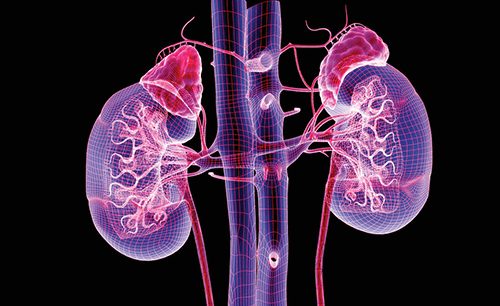Results of the CREDENCE (Canagliflozin and Renal Events in Diabetes with Established Nephropathy Clinical Evaluation) trial have been published in the New England Journal of Medicine, demonstrating a 30% reduction in renal outcomes with canagliflozin compared with placebo in people with type 2 diabetes and chronic kidney disease (CKD).
A total of 4401 people with type 2 diabetes and CKD (defined as an estimated glomerular filtration rate [eGFR] of 30 to <90 mL/min/1.73 m2 and a urinary albumin:creatinine ratio of >34 mg/mmol) were randomised 1:1 to either canagliflozin 100 mg once daily or placebo, both in conjunction with their current ACE inhibitor or ARB therapy. The trial was stopped early in July 2018 as the prespecified efficacy criteria had already been met.
Over a median follow-up of 2.62 years, the primary composite outcome of end-stage kidney disease, doubling of serum creatinine, or renal or cardiovascular death occurred significantly less in the canagliflozin group than in the placebo group (43.2 vs 61.2 events per 1000 person-years; hazard ratio [HR], 0.70; 95% confidence interval [CI], 0.59–0.82). The rate of eGFR decline was also slower in the canagliflozin group, despite initial reductions in the first few weeks of treatment that are expected with sodium–glucose cotransporter 2 inhibitor therapy.
Cardiovascular outcomes, including a composite of cardiovascular death, or hospitalisation for heart failure (HR, 0.69; 95% CI, 0.57–0.83); cardiovascular death, myocardial infarction or stroke (HR, 0.80; 95% CI, 0.67–0.95); and hospitalisation for heart failure (HR, 0.61; 95% CI, 0.47–0.80), were also less common in the canagliflozin group.
Regarding expected side effects, there was no significant difference in the risk of lower-limb amputation (HR, 1.11; 95% CI, 0.79–1.56) or fracture (HR, 0.98; 95% CI, 0.70–1.37) between the groups. Diabetic ketoacidosis was more frequent in the canagliflozin group, but overall the events were rare (2.2 vs 0.2 events per 1000 person-years).
These findings were observed despite only modest between-group differences in blood glucose, weight and blood pressure, suggesting that the mechanism of benefit is likely to be independent of these factors; one posited mechanism is a reduction in intraglomerular pressure.
The authors point out that people with very advanced CKD (eGFR <30 mL/min/1.73 m2), non-albuminuric or microalbuminuric disease, and non-diabetes-related kidney disease were excluded, so it is not known whether these findings can be generalised to such populations.






